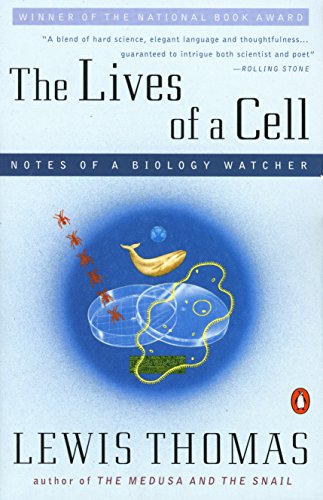The Lives Of A Cell
Lewis Thomas

An interesting and thoughful series of meditations on matters inspired by biology, but often of wider relevance. Lots of hints of the significance of distributed organisms, but a lot to think about in the idea of something living in pieces across separate genomes.
it is illusion to think that there is anything fragile about the life of the earth;
But I think it was chiefly the plastic, which seems to me the most unearthly of all man’s creations so far. I do not believe you can suspend army ants away from the earth, on plastic, for any length of time. They will lose touch, run out of energy, and die for lack of current.
The joint building activity that consumes most of our energy and binds us together is, of course, language, but this is so overwhelming a structure and grows so slowly that none of us can feel a personal sense of participating in the work
The great secret, known to internists and learned early in marriage by internists’ wives, but still hidden from the general public, is that most things get better by themselves. Most things, in fact, are better by morning.
Today’s behavior is no more fixed than when we tumbled out over Europe to build cathedrals in the twelfth century. At that time we were convinced that it would go on forever, that this was the way to live, but it was not; indeed, most of us have already forgotten what it was all about.
The truth is, we have become more deeply involved than we ever dreamed. The fact that we sit around as we do, worrying seriously about how best to preserve the life of the earth, is itself the sharpest measure of our involvement. It is not human arrogance that has taken us in this direction, but the most natural of natural events. We developed this way, we grew this way, we are this kind of species.
If we keep at it, we will become a computer to end all computers, capable of fusing all the thoughts of the world into a syncytium.
we might be tempted to take over the control of ourselves in order to make long-range plans, and that would surely be the end of us. It would mean that some group or other, marvelously intelligent and superbly informed, undoubtedly guided by a computer, would begin deciding what human society ought to be like, say, over the next five hundred years or so, and the rest of us would be persuaded, one way or another, to go along. The process of social evolution would then grind to a standstill, and we’d be stuck in today’s rut for a millennium.